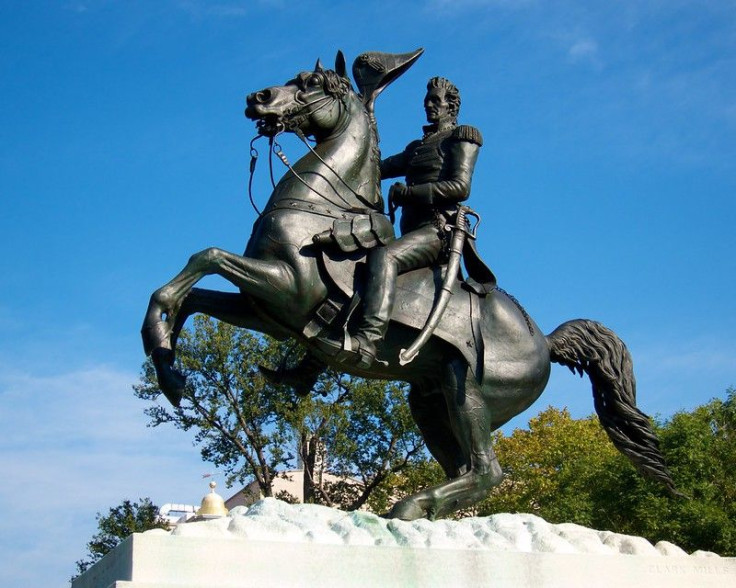Statue Of Former President Andrew Jackson To Be Removed In Jackson, Mississippi
KEY POINTS
- The City Council for Jackson, Mississippi, voted to remove the statue of President Andrew Jackson located outside City Hall
- It has not been decided where the statue will be moved to, but one councilwoman said the most likely location will be a local museum
- President Donald Trump has been a vocal defender of controversial statues in the wake of the Black Lives Matter protests, warning anyone caught attempting to vandalize or damage statues will face federal charges
Officials in Jackson, Mississippi, voted to officially remove a bronze statue of President Andrew Jackson located outside City Hall. The Jackson City Council voted 5-1 Tuesday along party lines to remove the statue, with the only dissenting vote being the council’s lone Republican, Councilman Ashby Foote.
“I'm a big history buff. The whole idea of tearing down historical statues and monuments is generally a bad idea. We need to understand our history, not tear it down,” Foote told the Mississippi Clarion-Ledger.
The statue will be relocated once removed, though it has not been decided where it will go. Councilwoman Virgi Lindsay said the most likely location will be a local museum.
Jackson Mayor Chokwe A. Lumumba said he was pleased with the city council’s decision, saying it will help separate the city from “the legacy of a brutal owner of enslaved people who was instrumental in initiating the Trail of Tears against indigenous people.” He suggested a statue of World War II veteran and civil rights activist Medgar Evers go up in the statue’s place.
“This is the first step,” Councilman Melvin Priester. “It's not coming down tomorrow or anything like that. We will need to do the appropriate research and take those steps to do it appropriately since it is a historic landmark.”
Along with Confederate monuments, there have been increased calls to remove statues of President Andrew Jackson in the wake of the Black Lives Matter protests. As stated by Mayor Lumumba, this is due to his history as a notable slave owner and signing the Indian Removal Act in 1830, which began the mass relocation of Native Americans known as the Trail of Tears.
The Trail of Tears resulted in the deaths of thousands of Native Americans from the Cherokee, Choctaw, Creek, Seminole, and Chickasaw tribes, though the exact death toll is unknown.
Despite Jackson’s history, President Donald Trump has been outspoken in his admiration for the U.S. Army General who served as president from 1829 to 1837 and is featured on the $20 bill. Trump has repeatedly said Jackson is his “favorite president” and had a portrait of Jackson hung in the White House’s Oval Office.
On June 23, Trump tweeted he had “authorized” federal authorities to arrest anyone caught vandalizing or attempting to “destroy” monuments on federal property. This followed attempts by Black Lives Matter protesters to pull down the monument of Jackson in Lafayette Square, outside the White House.

© Copyright IBTimes 2024. All rights reserved.





















